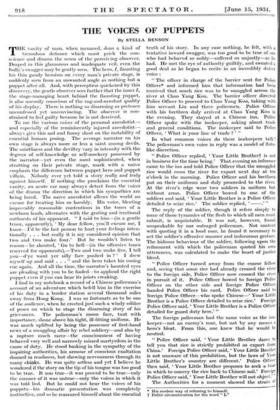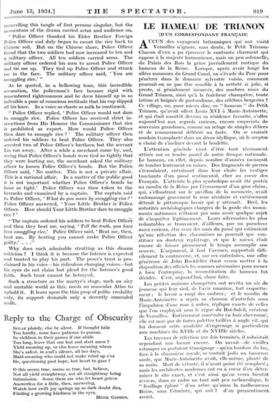THE VOICES OF PUPPETS
By STELLA BENSON
THE vanity of man, when menaced, dons a kind of tremulous defiance which must prick the con- science and disarm the scorn of the perceiving observer. Draped in this glamorous and inade'quate veil, even the bully's swagger may be gently seen. The hero, I, flaunting his thin gaudy heroism on every man's private stage, is suddenly seen from an unwonted angle as nothing but a puppet after all. And, with perception quickened by this discovery, the gentle observer sees further that the inner I, the stage-managing heart behind the flaunting puppet, is also uneasily conscious of the rag-and-sawdust quality of his display. There is nothing so disarming as pretence unconfessed yet unconvincing. The observer is con- strained to feel guilty because he is not deceived.
To me the various voices of the personal anecdotist— and especially of the reminiscently injured anecdotist— always give this sad and funny slant on the instability of essential human posing. The average narrator on his own stage is always more or less a saint among deirils. The saintliness and the deviltry vary in intensity with the degrees of self-knowledge or self-mockery possessed by the narrator—yet even the. most sophisticated, when strutting on their private stage, mark with a naive emphasis the difference between puppet hero and puppet villain. Nobody ever yet told a story really and truly against himself. If -nothing else proclaims the essential vanity, an acute ear may always detect from the voices of the drama the direction in which his sympathies are being lured. The naive anecdotist allows the world no excuse for treating him so harshly. His voice, bleating impeccably reasonable contentions in the tones of a newborn lamb, alternates with the grating and irrational outbursts of his opponent. " I said to him—(in a gentle tenor, apparently), ` My dear fellow, you'll excuse me, I know—I'd be the last person to hurt your feelings inten- tionally . . . but really it is my considered opinion that two and two make four.' But he wouldn't listen to reason—he shouted, ` Go to hell—(in the offensive tones reserved for opponents),—Two and two make five, I tell you—d'ye want yer silly face pushed in ? ' I drew myself up and said . . . " and the hero takes his cooing cue again. And all the time, the narrator's haunted eyes are pleading with you to be fooled—to applaud the right puppet even if you can hear its joints creaking.
I find in my notebook a record of a Chinese policeman's account of an adventure which befell him in the exercise • of his duty in a border station several thousand miles away from Hong Kong. I was so fortunate as to be one of the audience, when he erected just such a windy edifice of poses on which to stage the disarming story of his grievances. The policeman's moon face, taut with importance, shone above his tight, ill-fitting uniform. He was much uplifted by being the possessor of first-hand news of a smuggling affair by rebel soldiery—and also by a rapture much rarer—the consciousness of having behaved very well and narrowly missed martyrdom in the cause of duty. He stood basking in the sympathy of the inquiring authorities, his armour of conscious exaltation donned in readiness, but showing nervousness through its many chinks. He was quite artless and yet I believe he wondered if the story on the tip of his tongue was too good to be true. It was true—it was proved to be true—only the manner of it was untrue—only the voices in which it was told lied. But he could not hear the voices of his puppets—his dramatic presentation was completely instinctive, and so he reassured himself about the essential truth of his story. In any case nothing, he felt, with a tentative inward swagger, was too good to be true of one who had behaved so nobly—suffered so unjustly—as he had. He met the eye of authority guiltily, and sweated a good deal as he began to recite in an incredibly dulcet voice : " The officer in charge of the barrier sent for Police Officer* and informed him that information had been received that much rice was to be smuggled across the river at Chao Yang Kou. The barrier officer directed Police Officer to proceed to Chao Yang Kou, taking with him servant Liu and three policemen. Police Officer with his brethren duly arrived at Chao Yang Kou in the evening. They stayed at a Chinese inn. Police Officer spoke with the innkeeper, asking about trade and general conditions. The innkeeper said to Police Officer, ' What is your line of trade ? ' " In what common voices do these innkeepers talk ! The policeman's own voice in reply was a model of flute- like discretion.
" Police Officer replied, ' Your Little Brother l- is not in business for the time being.' That evening an informer came to the inn and told Police Officer that the smuggled rice would cross the river for export next day at ten o'clock in the morning. Police Officer and his brethren put on their uniforms and duly proceeded to the river. At the river's edge were two soldiers in uniform but without arms. Police Officer bowed to one of the soldiers and said, ` Your Little Brother is a Police Officer detailed to seize rice.' The soldier replied, ` —.2 ), The reply of the soldier, though it refers simply to some of those tyrannies of the flesh to which all men must submit, is unprintable. It was not, however, found unspeakable by our outraged policeman. Not content with quoting it in a loud roar, he found it necessary to act the soldier's offensive manner and indecorous gesture. The hideous behaviour of the soldier, following upon the -refinement with which the policeman quoted his own utterances, was calculated to make the heart of justice bleed.
" Police Officer turned away from the coarse fellow and, seeing that some rice had already crossed the river to the foreign side, Police Officer now crossed the river in pursuit of it.- Police Officer bowed to foreign Police Officer on the other side and foreign Police Officer handed Police Officer his card. Police Officer said to foreign Police Officer—who spoke Chinese—` Your Little Brother is a Police Officer detailed to seize rice.' Foreign Police Officer said, ' Your Little Brother is a Police Officer detailed for guard duty here.' " The foreign policeman had the same voice as the inn keeper—not an enemy's roar, but not by any means 3 hero's bleat. From this, one knew that he would be neutral.
" Police Officer said, ` Your Little Brother dares to tell you that rice is strictly prohibited as export from China.' Foreign Police Officer said, ` Your Little Brother is not unaware of this prohibition, but the laws of Your Little Brother's country are different.' Police Officer then said, ' Your Little Brother proposes to seek a boat in which to convey the rice back to Chinese soil.' Foreign Police Officer said, ` Your Little Brother will not object.' The Authorities for a moment showed the strain of
• His modest way of referring to himself. t Polite circumlocution for the word " L"
unravelling this tangle of first persons singular, but the momentum of the drama carried actor and audience on.
" Police Officer thanked his Elder Brother Foreign Police Officer and duly began to escort the rice back to Chinese soil.. But on the Chinese shore, Police Officer found that the two soldiers had now increased to ten and a military officer. All ten soldiers carried arms. The military officer ordered his men to arrest Police Officer and tie me up. They tied up Police Officer and struck me in the face. The military officer said, ' You are smuggling rice.' " As he quoted, in a bellowing tone, this incredible accusation, the policeman's face became rigid with remembered righteousness and he drew himself up in so inflexible a pose of conscious rectitude that his cap slipped off his knee. In a voice as chaste as milk he continued.
" Police Officer replied, ' Police Officer would not dare to smuggle rice. Police Officer has received strict in- structions from His Honour the Commissioner that rice is prohibited as export. How would Police Officer then dare to smuggle rice ? ' The military officer then ordered his soldiers to beat Police Officer. They also arrested two of Police Officer's brethren but the servant Liu ran away. After a while a merchant came by, and, seeing that Police Officer's bonds were tied so tightly that they were hurting me, the merchant asked the military officer to loosen Police Officer's bonds. But the Police Officer said, No matter. This is not a private affair. This is a national affair. In a matter of the public good it is not important whether Police Officer's bonds be loose or tight.' Police Officer was then taken to the barracks and examined by a captain. The captain said to Police Officer, ' What do you mean by smuggling rice ? ' Police Officer answered, ' Your Little Brother is Police Officer. How should Your Little Brother dare to smuggle rice ? '
"The captain ordered his soldiers to beat Police Office–r and then they beat me, saying, ' Tell the truth, you have been smuggling rice.' Police Officer said, ' Beat me, then, beat me. By beating you cannot make Police Officer guilty.' . .
Why does such admirable strutting as this disarm criticism ? I think it is because the listener is expected and trusted to play his part. The poser's trust is pro- claimed in his voice—his ridiculous changing voices—but his eyes do not claim but plead for the listener's good faith. Such trust cannot be betrayed.
Such a structure as the martyr's stage, such an airy and unstable world as this, needs no muscular Atlas to uphold it. It leans upon the thin prop,of polite credulity only, its support demands only a decently concealed smile.

















































 Previous page
Previous page